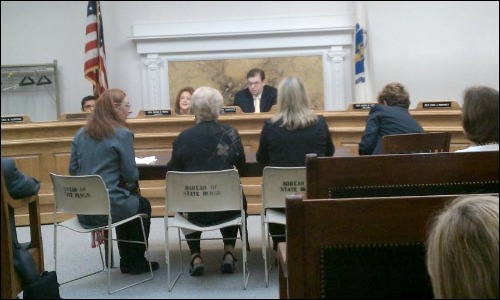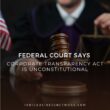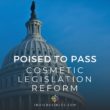If you are not familiar with the Massachusetts cosmetics legislation, read here and here. Today's hearings concluded mid-afternoon. So far, I have received two reports from IBN members who were in attendance and testified: Susan Mann of Manor Hall Soap Co. and Deb Scanlan of Grace Farm Organics.

In the photo, you can see left to right (with their backs to the camera): Susan Mann, an unidentified person (so far, at least), Marla Bosworth, and Deb Scanlan. (Photo credit: Nunzio Bruno.) In addition to Susan and Deb, several others testified including representatives from the Campaign For Safe Cosmetics, Personal Care Products Council and also IBN member Marla Bosworth of Back Porch Soap Co., whom I understand testified on behalf of her company as well as on behalf of the Handcrafted Soapmakers Guild. Here's more …
My update from Deb was brief, but she told me the hearings went well and she was happy for a chance to share her perspective on the bill as a small cosmetics manufacturer. Susan provided a few more details and I wanted to share some of them with you. Here are the four main points Susan made in her testimony today.
- Ingredient labeling. Susan showed an example of what a label for a 2-ounce jar of cream would look like — several paragraphs long — if the bill passes as drafted. She used data collected from this Essential Wholesale blog post to make her point on this topic.
I understand this made quite an impression, as she opened a 2-ounce jar and removed a long piece of paper containing the ingredient label.
- Pending federal legislation. Susan testified that since the FDA currently regulates cosmetics, and since The Safe Cosmetics Act of 2011 (which addresses the same issues as the Massachusetts bill) is now pending in Congress, lawmakers should not rush to pass a state law when the existing federal law and one under consideration would serve the same purpose.
- Composition of the Commission on Safe Cosmetics. Susan pointed out that, if the Commission on Safe Cosmetics called for in the bill was required to include a signatory to the Compact For Safe Cosmetics, it should also contain a small cosmetics manufacturer who is not affiliated with the Compact.
- Explore need for legislation in advance of drafting it. Susan suggested that introducing legislation before the Commission studies and reports on the actual need for legislation is putting the cart before the horse. She testified that exploring the current state of science and the industry should come first.
I have a call into the Massachusetts Joint Committee on Public Health to request a transcript or audio recording of the proceedings so I can share more precise information with you. Meanwhile, I look forward to updates by those in attendance (including Nunzio Bruno, a staunch supporter of small businesses and whose company, Financially Digital, provides business coaching and consulting services to small businesses in Massachusetts) so we can benefit from their experiences and impressions too.
Thanks to Susan, Deb, Marla and everyone who took time from their busy schedules today to speak for small businesses!
Advocacy continues, and as I discover new information, I will update you.



